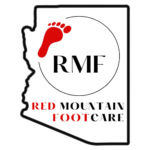Preventing Common Foot Injuries While Hiking
Hiking is a fun, safe, and healthy activity when proper precautions are taken. Here are some tips to help prevent foot injuries while out on the trails.
 Tips for Preventing Hiking Foot Injuries
Tips for Preventing Hiking Foot Injuries
- Try not to overpack.
- Take only what is necessary, as this can help take the pressure off your feet.
- Make sure to wear hiking boots as these are developed to offer more grip and cushioning than a sneaker.
- To prevent blisters, use moleskin, tape, or even bandages on areas where friction is likely.
- Wear moisture-wicking socks to help keep your feet dry, further helping in the prevention of blisters.
- Tools like hiking poles can help provide stability and take some weight off your back, so it’s not a bad idea to bring a pair.
By following these tips, you can help reduce the likelihood of falls and foot injuries. If you happen to hurt your feet while hiking, be sure to see a podiatrist so that you can be diagnosed and cared for properly.
Blisters are prone to making everyday activities extremely uncomfortable. If your feet are hurting, contact Dr. Hardy of Red Mountain Footcare. Our doctor can provide the care you need to keep you pain-free and on your feet.
Foot Blisters
Foot blisters develop as a result of constantly wearing tight or ill-fitting footwear. This happens due to the constant rubbing from the shoe, which can often lead to pain.
What are Foot Blisters?
A foot blister is a small fluid-filled pocket that forms on the upper-most layer of the skin. Blisters are filled with clear fluid and can lead to blood drainage or pus if the area becomes infected.
How do Blisters Form?
Blisters on the feet are often the result of constant friction of skin and material, usually by shoe rubbing. Walking in sandals, boots, or shoes that don’t fit properly for long periods of time can result in a blister. Having consistent foot moisture and humidity can easily lead to blister formation.
Prevention & Treatment
It is important to properly care for the affected area in order to prevent infection and ease the pain. Do not lance the blister and use a Band-Aid to provide pain relief. Also, be sure to keep your feet dry and wear proper fitting shoes. If you see blood or pus in a blister, seek assistance from a podiatrist.
If you have any questions, please feel free to contact our office located in Mesa, AZ. We offer the newest diagnostic and treatment technologies for all your foot care needs.
